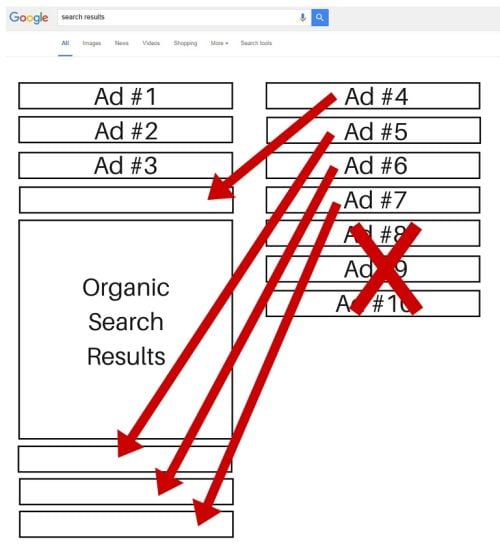Changes to Google’s SERPs: Don’t Panic!
Matt Brady#Digital Marketing, #SEO

Google recently changed the way search results and ads are displayed on their Search Engine Results Pages (SERPs). We discuss what that means for you.
In the world of Search Engine Optimization (SEO), everything Google does is worthy of notice, and occasionally they do something that really makes waves. This happened a few weeks ago, when Google rearranged the way search results and ads are displayed on their Search Engine Results Pages (SERPs). As could be expected, this caused a great deal of consternation for both SEO experts and people who utilize Google AdWords for their Pay Per Click (PPC) campaigns.
Now that the dust has settled a bit, we wanted to take a look at what exactly has changed and how this affects the world of SEO and PPC:
What Changes Were Made?
On February 19, 2016, Google confirmed that they were updating their SERPs to remove the ads that displayed to the right of search results. Previously, up to three ads had displayed above the organic search results, and several more would display in the “right rail” of the page. The updated SERPs now display up to four ads above organic search results, and up to three more ads below the organic results.

The only exceptions to this change are Google Shopping Campaigns (also known as Product Listing Ads or PLAs) and information in the Google Knowledge Panel. When this type of information is relevant to search results, it may still be displayed to the right of the main search results.
What Does This Mean For Me?
Whenever Google makes any changes, either to the algorithms that determine search rankings or the way search results are displayed, the SEO community goes into a tizzy, trying to ensure that their sites aren’t negatively affected.
PPC advertisers were especially worried about this change, fearing that the reduced number of ads on search results pages would cause an increase in the cost per click (CPC) for AdWords ads, leading to higher advertising costs. Fortunately, these fears have not been borne out. Based on the data that Merkle/RKG have gathered about the performance of PPC ads, there hasn’t been a significant increase in average CPC.
It also seems that ads which had previously appeared in the right rail were often not very good performers, so their changes in location or outright disappearance from the first page of search results has not caused much of a change in performance. However, ads that now appear in the #4 position are seeing an increase in performance, which means that PPC advertisers now have more opportunity to get their ads placed where people are likely to see and click on them.
There was also some concern that with organic search results being pushed farther down the page, the traffic coming to websites from these results would suffer. However, as with CPC, the data shows that the traffic coming from organic results has been stable.
Don’t Panic!
As with any change that Google makes, marketers and SEO experts are still figuring out how to ensure that sites can take advantage of them to achieve the ideal search rankings for their websites. While it can be tempting to try to make immediate changes to try to fit into what you think Google wants, we recommend focusing on making sure that your site contains quality content, provides users with a good, intuitive experience, and is accessible on every device and screen size.
If you have any questions about how to make sure your site meets these goals, we can help! Contact us to speak with a Solutions Engineer, and we’ll work with you to ensure you’re meeting the standards that will help you receive the search rankings you deserve. If you have any other questions, or if you would like to share your own SEO or PPC tips, please feel free to leave a comment below. We’d love to hear from you!
Related Posts

Generative Engine Optimization (GEO): Creating Content For AI-Search
Generative Engine Optimization (GEO) boosts your content's visibility in AI search. Discover 5 key strategies for platforms like Perplexity and Gemini.
The Continuing Rise of Zero-Click Search (and What You Can Do About It)
In a zero-click internet search environment, your website needs to be fully-optimized for every organic click - here's what you need to do..
Results Matter.
We design creative digital solutions that grow your business, strengthen your brand and engage your audience. Our team blends creativity with insights, analytics and technology to deliver beauty, function, accessibility and most of all, ROI. Do you have a project you want to discuss?
Like what you read?
Subscribe to our blog "Diagram Views" for the latest trends in web design, inbound marketing and mobile strategy.
